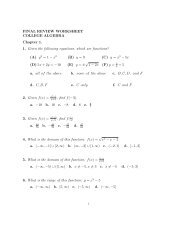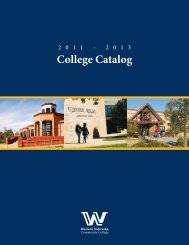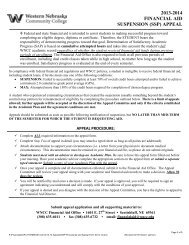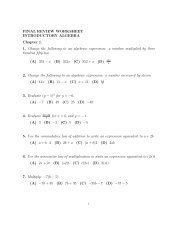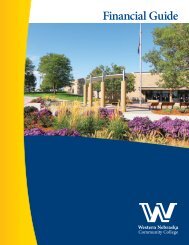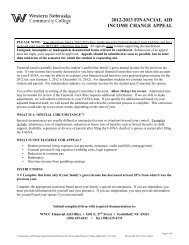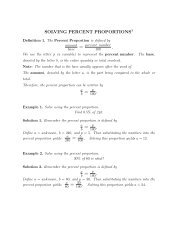WNCC 2010 Self-Study Report - Western Nebraska Community ...
WNCC 2010 Self-Study Report - Western Nebraska Community ...
WNCC 2010 Self-Study Report - Western Nebraska Community ...
Create successful ePaper yourself
Turn your PDF publications into a flip-book with our unique Google optimized e-Paper software.
Criterion 4: Acquisition, Discovery, and Application of Knowledge<br />
The organization’s promotes a life of learning for its faculty, administration,<br />
staff, and students by fostering and supporting inquiry, creativity, practice,<br />
and social responsibility.<br />
Core Component 4a: The organization demonstrates, through the actions of<br />
its board, administrators, students, faculty, and staff, that it values a life of<br />
learning.<br />
Every employee and official associated with <strong>WNCC</strong> believes in learning, whether it is traditional<br />
students completing specific educational-path requirements, returning non-traditional learners<br />
wanting to change careers, or their own continued growth. The endorsement of learning as the<br />
primary purpose of the College’s existence is demonstrated in numerous ways by various<br />
components of the institution.<br />
WCCA Board Policy<br />
The <strong>Western</strong> <strong>Community</strong> College Area Board of Governors values a life of learning by espousing<br />
the essential academic principles of freedom of inquiry and expression while acknowledging the<br />
responsibilities associated with such self-determination. Board policy affirms that, “In the<br />
development of knowledge, research endeavors and creative activities, the College staff and<br />
student must be free to cultivate a spirit of inquiry and scholarly criticism.” The policy clarifies that<br />
examining ideas in “an atmosphere of freedom and confidence” is fundamental to the role of the<br />
institution (RR 95). The <strong>Western</strong> <strong>Nebraska</strong> <strong>Community</strong> College Philosophy statement affirms that<br />
<strong>WNCC</strong> and its employees are “committed to serving the residents of western <strong>Nebraska</strong> with higher<br />
education and lifelong learning opportunities” (RR 96).<br />
Administrative Policy<br />
Likewise, administrative policy, as imparted to instructors in the Faculty and Staff handbook, places<br />
an emphasis on professionalism, stating that instructors are “required to possess a comprehensive<br />
knowledge of the field of study, preparation and intense interest in students, a sensitivity toward<br />
student interests, open-mindedness, a commitment to creative inquiry and investigation, and an<br />
intellectual enthusiasm which transmits to the students” (RR 97).<br />
Instructors are expected to keep current regarding specific disciplines and to integrate that<br />
knowledge into the classroom, an expectation supported by the previously discussed options for<br />
professional development and salary incentives linked to continuing educational attainment. In<br />
addition, <strong>WNCC</strong>’s tuition remission policy allows staff, faculty, and dependents to take courses at<br />
the College with no charge for tuition.<br />
Faculty Members<br />
<strong>Western</strong> <strong>Nebraska</strong> <strong>Community</strong> College faculty members create an individual course syllabus or<br />
course outline for each course based upon the master syllabus. While the master syllabi outline<br />
the primary topics which must be included in courses, faculty members are, according to the<br />
Faculty and Staff Handbook, “encouraged to be creative and to exercise academic freedom<br />
<strong>Western</strong> <strong>Nebraska</strong> <strong>Community</strong> College Page 133



